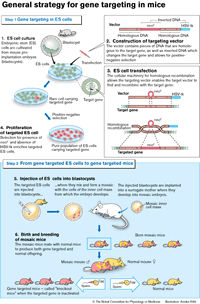Nobel Prize in Chemistry 2004 awarded for the discovery of ubiquitin-mediated protein degradation
Advertisement
The Royal Swedish Academy of Sciences has decided to award the Nobel prize in chemistry for 2004 "for the discovery of ubiquitin-mediated protein degradation" jointly to
Aaron Ciechanover (Technion - Israel Institute of Technology, Haifa, Israel,)
Avram Hershko (Technion - Israel Institute of Technology, Haifa, Israel)
Irwin Rose (University of California, Irvine, USA)
Proteins labelled for destruction
Proteins build up all living things: plants, animals and therefore us humans. In the past few decades biochemistry has come a long way towards explaining how the cell produces all its various proteins. But as to the breaking down of proteins, not so many researchers were interested. Aaron Ciechanover, Avram Hershko and Irwin Rose went against the stream and at the beginning of the 1980s discovered one of the cell's most important cyclical processes, regulated protein degradation. For this, they are being rewarded with this year's Nobel Prize in Chemistry.
Aaron Ciechanover, Avram Hershko and Irwin Rose have brought us to realise that the cell functions as a highly-efficient checking station where proteins are built up and broken down at a furious rate. The degradation is not indiscriminate but takes place through a process that is controlled in detail so that the proteins to be broken down at any given moment are given a molecular label, a 'kiss of death', to be dramatic. The labelled proteins are then fed into the cells' "waste disposers", the so called proteasomes, where they are chopped into small pieces and destroyed.
The label consists of a molecule called ubiquitin. This fastens to the protein to be destroyed, accompanies it to the proteasome where it is recognised as the key in a lock, and signals that a protein is on the way for disassembly. Shortly before the protein is squeezed into the proteasome, its ubiquitin label is disconnected for re-use.
Thanks to the work of the three Laureates it is now possible to understand at molecular level how the cell controls a number of central processes by breaking down certain proteins and not others. Examples of processes governed by ubiquitin-mediated protein degradation are cell division, DNA repair, quality control of newly-produced proteins, and important parts of the immune defence. When the degradation does not work correctly, we fall ill. Cervical cancer and cystic fibrosis are two examples. Knowledge of ubiquitin-mediated protein degradation offers an opportunity to develop drugs against these diseases and others.


































































